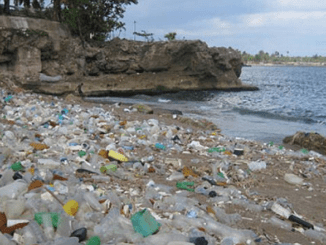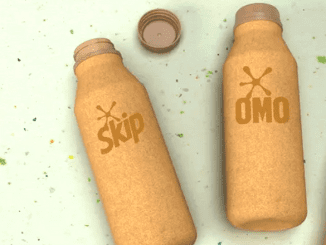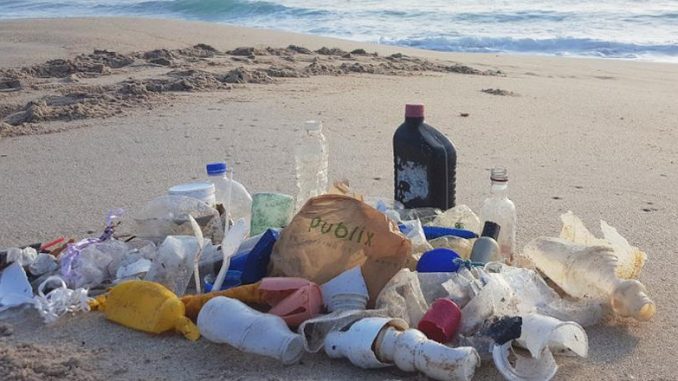
AMES, Iowa, August 5, 2021 (ENS) – In pursuit of a circular economy that captures waste plastic before it contaminates the environment, scientists are transforming discarded plastic items, originally made from petroleum, right back into oil in the form of liquid lubricants such as hydraulic fluids, heat transfer fluids and greases.
Different from traditional recycling, which recovers materials from items such as glass bottles or aluminum cans and reuses them to recreate the same product, upcycling creates higher-value products by chemically transforming them.
Led by Iowa State University, one project team includes Argonne National Laboratory, Chevron Philips Chemical Company, Chemstations Inc., American Packaging Corp., the City of Ames Resource Recovery Facility and Hy-Vee, alongside Texas A&M University.
Engineering professor Dr. Ali Erdemir, who specializes in mechanical engineering and materials science, leads the effort for Texas A&M.
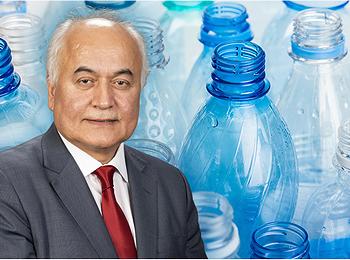
“By the end of our project, we hope that we turn plastic trash into lubricating treasures in a sound and cost-effective way, thus helping alleviate the dire consequences of plastic wastes, which are already hurting our planet in so many ways,” Dr. Erdemir said.
“If proven commercially viable, we expect our research findings to turn into a wide range of lubricating products – including engine oils and a wide range of industrial lubricants – that could help reduce energy consumption and the carbon footprint of future transportation and other industrial systems,” he said.
As a growing number of jurisdictions from small towns to entire countries ban the use of single use plastics, interest in upcycling is growing too.
The small city of Ames, Iowa, has become a national research epicenter for the rapidly emerging field of plastics upcycling. Researchers at Iowa State University, in tandem with Ames Laboratory, a U.S. Department of Energy National Laboratory, received multiple awards over the 2020 calendar year that could total over $20 million in research funding.
Four research projects spearheaded by Iowa State and Ames Laboratory investigators have received multiple federal awards to implement upcycling by exploring new ways to repurpose plastic waste into a host of value-added compounds, from fuel to food.
“Because most plastics do not decompose, waste in landfills and overflow into waterways continue to be a significant problem,” said Guru Rao, Iowa State interim vice president for research. “Not only does this pose a problem for our environment and natural resources, this also raises a host of human health concerns.”
“The idea of upcycling is a relatively new priority for funding agencies, and it is a tremendous success that Iowa State and Ames Laboratory researchers have so quickly established themselves as major players in this arena,” Rao said.
There’s an Institute for That
Iowa State’s entry into plastic upcycling research began last year with a $12.8 million, four-year grant to Ames Laboratory, funded through the DOE Energy Frontier Research Center, or EFRC, program, designed to bring together multi-disciplinary teams of scientists to tackle defining energy challenges of the 21st century.
This investment has allowed a multi-institutional team of scientists to form the Institute for Cooperative Upcycling of Plastics, iCOUP.
iCOUP includes researchers at Ames Laboratory, Argonne National Laboratory; University of California, Santa Barbara; University of South Carolina; Cornell University; Northwestern University; and University of Illinois, Urbana-Champaign.
The iCOUP partners will work to create catalysts that turn discarded single-use plastics into more valuable products, providing incentives to treat used plastics as a resource rather than as trash.
Across the United States only three million tons of the 35 million tons of plastic waste that consumers threw away in 2017 were recycled.
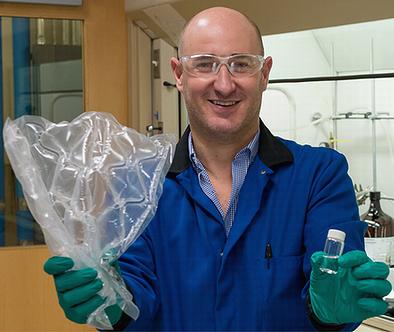
Polyolefins are the largest amount of discarded waste plastics, with six million tons of high-density polyethylene, eight million tons of low-density polyethylene, and eight million tons of polypropylene being discarded in the same year.
iCOUP has already developed a first-of-its-kind catalyst that is able to break down polyolefin plastics, which are originally produced from oil and natural gas. Polyolefin plastics include polyethylene and polypropylene, used in products like plastic grocery bags, milk jugs, and shampoo bottles.
The iCOUP catalyst process yields “uniform, high-quality components that can be used to produce fuels, solvents, and lubricating oils,” the scientists say.
Dr. Sadow also is seving as principal investigator for a second DOE-sponsored plastic upcycling project currently selected for funding, “Modular Catalytic Reactors for Single-Use Polyolefin Conversion to Lubricating Oils From Upcycled Plastics (LOUPs).”
“Plastics recycling has an economics problem,” said iCOUP’s director Dr. Aaron Sadow. “Available recycled plastics are commonly downcycled, meaning they are less valuable than the original plastic. We want to change the cycle by transforming waste plastics into new, higher-value products. We are thrilled to have the support of the DOE as we discover these new concepts.”
Iowa State secured another DOE grant last fall for $2.1 million to develop new plastics that can be used to make recyclable biobased films and bottles.
This Plastics Innovation Challenge project, called “Trojan Horse Repeat Sequences for Triggered Chemical Recycling of Polyesters for Films and Bottles,” is led by Iowa State professor of chemical and biological engineering Dr. Eric Cochran. It will bring together university researchers and partners Archer-Daniels Midland, 3M, and the beverage company Diageo, to process non-food starches from peas, wheat, and beans into upgradable furan-and phthalate-based building blocks.
This team’s approach will develop mild, water-based treatments that can be applied to modified versions of plastics currently in use and cause them to fall apart into building blocks that can be purified and rebuilt into like-new condition.
The strategy could be used to increase both the quality and quantity of recoverable waste plastics, even from mixed waste streams.
“Today, recycling is capital-intensive, labor-intensive, and energy-intensive; nearly half the energy and water required to make a beverage bottle is expended during the recycling process,” Cochran said. “This research will yield new plastics that can be recycled to like-new condition with less effort.”
Who Would Eat That?
Where many upcycling projects focus on turning plastic waste into commodity chemicals for manufacturing, another group of Iowa State researchers is investigating an unconventional approach by turning plastic into macronutrients for human consumption.
In September 2020, the U.S. Defense Advanced Research Projects Agency, DARPA, awarded a Phase I cooperative agreement of $2.7 million to Iowa State to create a system that converts wastes generated by military expeditionary forces into food.
The system, dubbed “Novel Oxo-degradation to Macronutrients for Austere Deployments,” or NOMAD, aims to convert plastic wastes into fatty alcohols and fatty acids.
The technology could potentially convert every pound of packaging and expendable supplies into four ounces of nutritionally balanced high-protein nourishment for military expeditionary forces.
Beyond the military, the conversion of waste into food could help address two problems – plastic disposal and food scarcity. While the effort’s initial cooperative agreement is for $2.7 million, it has the potential to entail up to $7.8 million in sponsored funding over the course of the project, according to Caitlin Ware with the Iowa State University Office of the Vice President for Research.
“Upcycling is trending among research agencies because the possibilities for recycling are pretty well exhausted,” said Dr. Robert C. Brown, the project’s principal investigator and Iowa State professor of engineering.
“Recycling captures value from only a small fraction of plastic wastes,” Brown said. “Upcycling, by adding value to plastic wastes, offers prospects for more economical use of discarded plastics, thus increasing the amount recovered from waste streams.”
Featured image: Plastic trash on a Florida beach April 28, 2017 (Photo courtesy Florida Dept. Fish & Wildlife)

